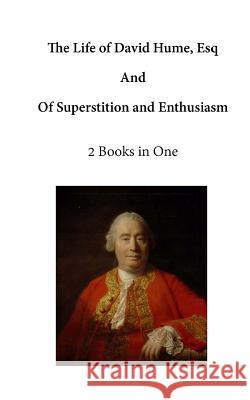The Life of David Hume, Esq: And of Superstition and Enthusiasm » książka
The Life of David Hume, Esq: And of Superstition and Enthusiasm
ISBN-13: 9781523295159 / Angielski / Miękka / 2016 / 38 str.
The Life of David Hume, Esq
And
Of Superstition and Enthusiasm
David Hume
2 Books in One
David Hume (26 April 1711 OS) - 25 August 1776) was a Scottish philosopher, historian, economist, and essayist, who is best known today for his highly influential system of radical philosophical empiricism, skepticism, and naturalism.
BOOK 1
The Life of David Hume, Esq
It is difficult for a man to speak long of himself without vanity; therefore, I shall be short. It may be thought an instance of vanity that I pretend at all to write my life; but this Narrative shall contain little more than the History of my Writings; as, indeed, almost all my life has been spent in literary pursuits and occupations. The first success of most of my writings was not such as to be an object of vanity.
I was born the 26th of April 1711, old style, at Edinburgh. I was of a good family, both by father and mother: my father's family is a branch of the Earl of Home's, or Hume's; and my ancestors had been proprietors of the estate, which my brother possesses, for several generations. My mother was daughter of Sir David Falconer, President of the College of Justice: the title of Lord Halkerton came by succession to her brother.
BOOK 2
Of Superstition and Enthusiasm
That the corruption of the best of things produces the worst, is grown into a maxim, and is commonly proved, among other instances, by the pernicious effects of superstition and enthusiasm, the corruptions of true religion.
These two species of false religion, though both pernicious, are yet of a very different, and even of a contrary nature. The mind of man is subject to certain unaccountable terrors and apprehensions, proceeding either from the unhappy situation of private or public affairs, from ill health, from a gloomy and melancholy disposition, or from the concurrence of all these circumstances. In such a state of mind, infinite unknown evils are dreaded from unknown agents; and where real objects of terror are wanting, the soul, active to its own prejudice, and fostering its predominant inclination, finds imaginary ones, to whose power and malevolence it sets no limits.











